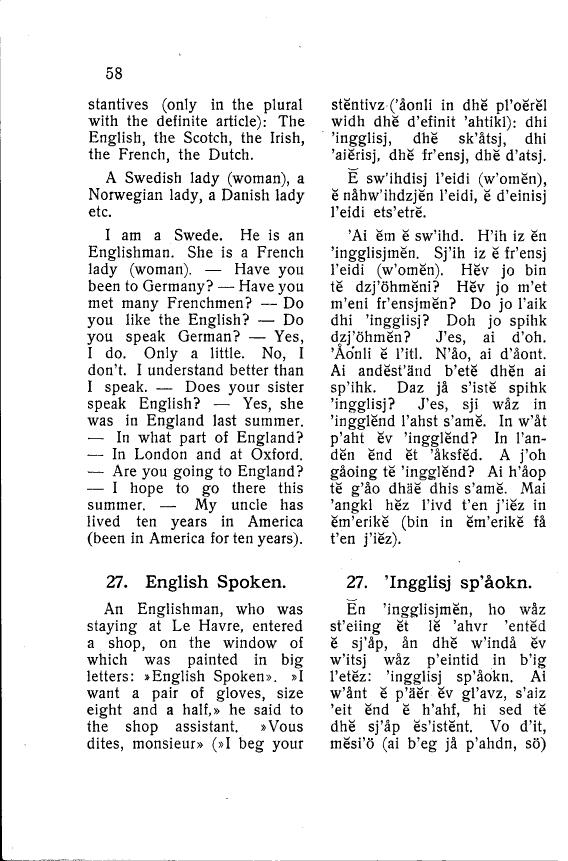
Full resolution (TIFF) - On this page / på denna sida - Läsestycken - 26. Geographical Words - 27. English Spoken

<< prev. page << föreg. sida << >> nästa sida >> next page >>
Below is the raw OCR text
from the above scanned image.
Do you see an error? Proofread the page now!
Här nedan syns maskintolkade texten från faksimilbilden ovan.
Ser du något fel? Korrekturläs sidan nu!
This page has never been proofread. / Denna sida har aldrig korrekturlästs.
58
stantives (only in the plural
with the definite article): The
English, the Scotch, the Irish,
the French, the Dutch.
A Swedish lady (woman), a
Norwegian lady, a Danish lady
etc.
I am a Swede. He is an
Englishman. She is a French
lady (woman). — Have you
been to Germany? — Have you
met many Frenchmen? — Do
you like the English? — Do
you speak German? — Yes,
I do. Only a little. No, I
don’t. I understand better than
I speak. — Does your sister
speak English? — Yes, she
was in England last summer.
— In what part of England?
— In London and at Oxford.
— Are you going to England?
— I hope to go there this
summer. — My uncle has
lived ten years in America
(been in America for ten years).
stĕntivz (’åonli in dhĕ pl’oĕrĕl
widh dhĕ d’efinit ’ahtikl): dhi
’ingglisj, dhĕ sk’åtsj, dhi
’aiĕrisj, dhĕ fr’ensj, dhĕ d’atsj.
E sw’ihdisj 1’eidi (w’omĕn),
ĕ nåhw’ihdzjĕn l’eidi, ĕ d’einisj
l’eidi ets’etrĕ.
’Ai ĕm ĕ sw’ihd. H’ih iz ĕn
’ingglisjmĕn. Sj’ih iz ĕ fr’ensj
l’eidi (w’omĕn). Hĕv jo bin
tĕ dzj’öhmĕni? Hĕv jo m’et
m’eni fr’ensjmĕn? Do jo l’aik
dhi ’ingglisj? Doh jo spihk
dzj’öhmĕn? J’es, ai d’oh.
’Åonli ĕ l’itl. N’åo, ai d’åont.
Ai andĕst’ärid b’etĕ dhĕn ai
Sp’ihk. Daz jå s’istĕ spihk
’ingglisj? J’es, sji wåz in
’ingglĕnd l’ahst s’amĕ. In w’åt
p’aht ĕv ’ingglĕnd? In
l’an-dĕn ĕnd ĕt ’åksfĕd. A j’oh
gåoing tĕ ’ingglĕnd? Ai h’åop
tĕ g’åo dhäĕ dhis s’amĕ. Mai
’angkl hĕz l’ivd t’en j’iĕz in
ĕm’erikĕ (bin in ĕm’erikĕ få
t’en j’iĕz).
27. English Spöken.
An Englishman, who was
staying at Le Havre, entered
a shop, on the window of
which was painted in big
letters: »English Spoken». »I
want a pair of gloves, size
eight and a half,» he said to
the shop assistant. »Vous
dites, monsieur» (»I beg your
27. ’Ingglisj sp’åokn.
En ’ingglisjmĕn, ho wåz
st’eiing ĕt le ’ahvr ’entĕd
ĕ sj’åp, ån dhĕ w’indå ĕv
W’itsj wåz p’eintid in b’ig
l’etĕz: ’ingglisj sp’åokn. Ai
w’ånt ĕ p’äĕr ĕv gl’avz, s’aiz
’eit ĕnd ĕ h’ahf, hi sed tĕ
dhĕ sj’åp ĕs’istĕnt. Vo d’it,
mĕsi’ö (ai b’eg jå p’ahdn, so)
<< prev. page << föreg. sida << >> nästa sida >> next page >>